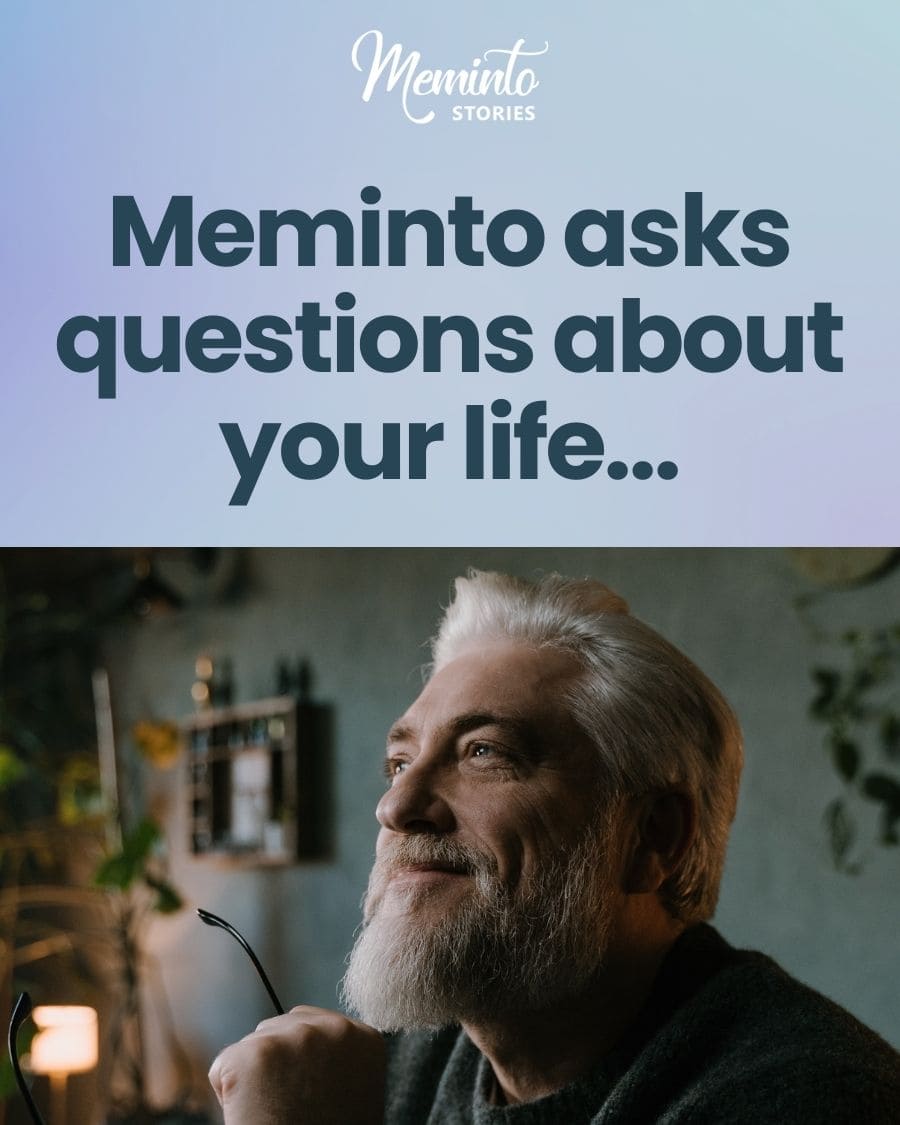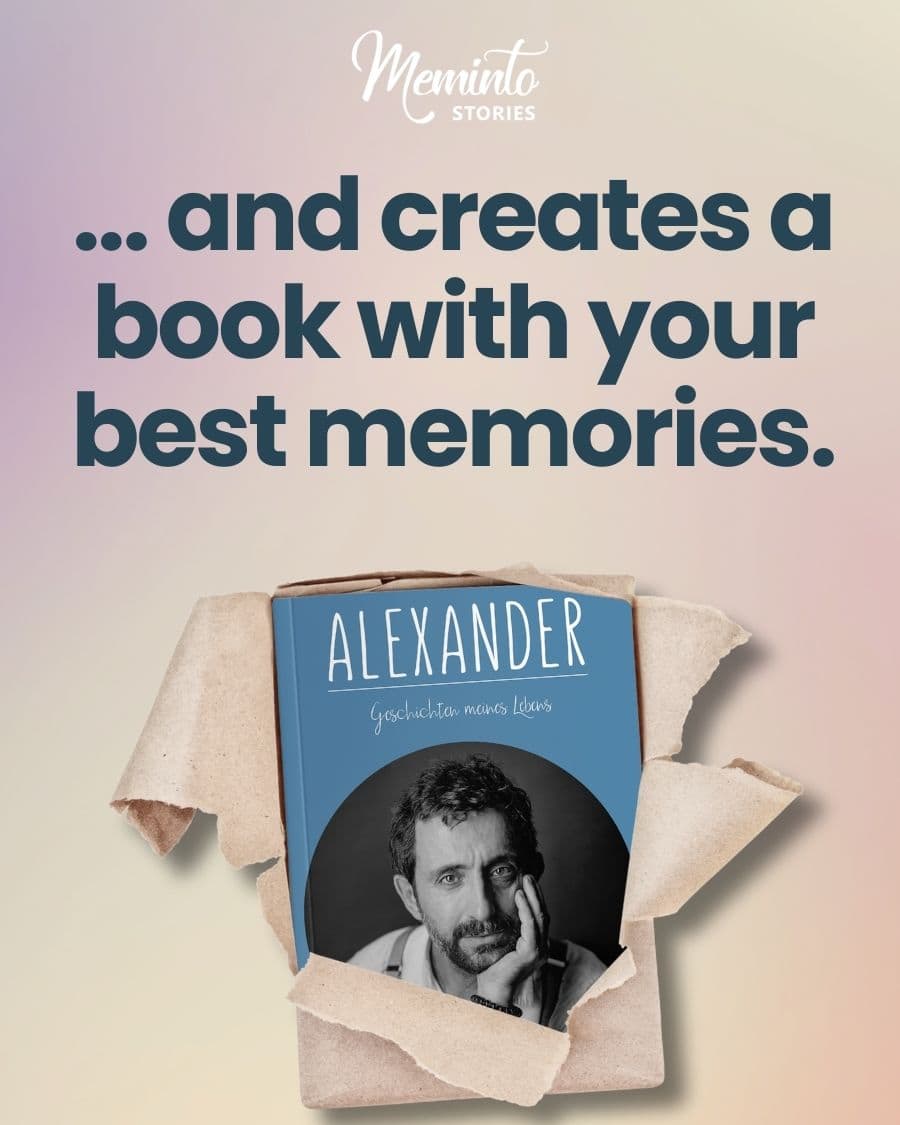Your story doesn’t have to be extraordinary to be powerful. It just has to be true. Every day, countless people sit down with the best intentions to write their memoir, only to stare at a blank page, wondering where to begin. The truth is, your life is already filled with moments worth preserving; you just need the right memoir prompts to bring them to light.
Most aspiring memoirists make the same mistake: they start with chronological facts instead of emotional truth. They begin with “I was born in…” rather than the moment that changed everything. But the most compelling memoirs aren’t built on dates and locations; they’re built on the feelings, conflicts, and revelations that shaped who you became.
As Gail from New York discovered, “I’ve been writing my life story since I was in my 20s,” but it wasn’t until she found the right approach that her memories finally flourished into a beautifully printed book. In this guide, you’ll discover 40 carefully crafted memoir prompts designed to unlock your most powerful stories.
Why most memoir writers start in the wrong place
The biggest mistake memoir writers make isn’t poor grammar or weak storytelling. It’s starting with facts when they should start with feelings.
I used to make this mistake myself when I first tried writing about my family. Walk into any library and pull a dozen self-published memoirs off the shelf, and nine of them will start the same way with “I was born on [date] in [place] to [parents’ names].” Most people start writing their life story like they’re filling out a form, listing births, deaths, graduations, and job changes in neat order. But readers don’t care about timelines; they care about the moments that changed everything.
After working with hundreds of memoir writers, I’ve learned something important. The facts of your life aren’t your story, but your story is how those facts made you feel, how they changed you, and how they shaped the person reading these words right now.
I learned this the hard way during my own writing attempts. I’d sit down with good intentions and immediately start with when and where I was born, then get bogged down trying to remember exact dates and wondering if anyone would care about my third-grade teacher’s name. The whole thing felt like homework rather than storytelling.
Consider the memoirs that moved you most. Did they grab you because of when something happened, or because of how it felt when everything changed? The power lies in the emotional turning points, not the factual milestones.
As Jost from Germany realized while writing his memoir, “A memoir like this also clarifies things for oneself.” He discovered that the real story wasn’t in the events themselves but in how those moments shaped his understanding of life. When you dig beneath the surface of what happened to explore why it mattered, that’s where your story comes alive.
I see this pattern constantly where memoir attempts die after a few chapters because writers wear themselves out listing every detail in order instead of focusing on the moments that truly changed them. The answer isn’t more discipline but better memoir writing prompts that guide you toward emotional truth from the start.
Jost didn’t begin his memoir with “I was born in 1952 in Hamburg” but started with the afternoon he realized his father’s war stories weren’t heroic adventures but desperate attempts to survive. That single moment at age 45, sitting in his father’s kitchen while helping him sort through old photographs, became the thread that connected his entire life story.
What struck me about Jost’s approach was how one shift in perspective illuminated everything else. The father who seemed distant suddenly made sense when viewed through the lens of trauma, and the family’s unspoken rules about never discussing the past became understandable. Everything that came before and after suddenly made sense through understanding how pain shapes the stories we tell ourselves and our children.
This is what I mean when I say start with feelings, not facts. Jost’s birth date and birthplace were just data points, but that moment of recognition in his father’s kitchen was the key that unlocked his entire story.
40 memoir prompts to uncover your most powerful stories
The right life story prompts don’t just ask what happened; they ask what it meant. These 40 personal memoir ideas are designed to bypass surface-level memories and guide you straight to the moments that shaped who you became.
When you answer “What was your first job?” you get a resume entry. When you answer “What moment at work made you realize you were stronger than you thought?” you get a story worth telling. The difference lies in how the question is asked.
Turning point moments
I’ve noticed something about the biggest moments in life. They rarely come with warning labels. Instead, they slip in during the middle of an ordinary day when you’re thinking about groceries or wondering if you remembered to lock the car.
You’re just living your life, and then something changes completely. It could be a single sentence someone says, or the way the light hits a room differently, or the moment you catch yourself making a choice you never thought you’d make. These are the scenes that stick with you for decades, the ones that divide your life into “before” and “after.”
- Describe the moment you realized your childhood was ending.
- What conversation changed the entire direction of your life?
- Write about a time when you had to choose between what was safe and what was right.
- What moment made you question everything you thought you knew about yourself?
- Describe the day you first felt truly adult.
- What failure taught you the most about who you are?
- Write about a moment when you had to stand up for something you believed in.
- What experience made you realize your parents were just human beings?
Family & Relationships
Growing up, I believed my family’s stories were facts set in stone. Every family has its mythology. The stories passed down at dinner tables, the legends whispered between cousins, the careful omissions that speak louder than words.
We grow up believing certain truths about where we come from, who our people are, what love looks like in our house. Then one day, usually when we’re not expecting it, the real story reveals itself. Sometimes it’s devastating, sometimes it’s liberating, but it always changes how we see ourselves and everyone we thought we knew.
Some prompts to help you write the stories about your experience with your family and relationships are:
- What family story did you believe as a child that you later learned wasn’t true?
- Describe the moment you first saw your parents as people, not just your caregivers.
- What did your grandmother’s hands tell you about her life?
- Write about a family tradition that once embarrassed you but you now treasure.
- What conversation with a parent do you wish you could have again?
- Describe the first time you felt truly understood by someone.
- What family secret changed how you saw everything?
- Write about someone who loved you in a way you didn’t understand until years later.
Challenges & Growth
Nobody asks to be tested, but life has a way of finding your weak spots anyway. These weak moments don’t feel like gifts when they’re happening; they feel like punishment or sort of like proof that the universe has it out for you.
But looking back, you realize something strange about the worst days. Most times, they might have taught you the most about who you really are, showing you strength you didn’t know you had and resilience that surprised everyone, including yourself.
Some prompts that could help you remember those challenges and see how far you’ve grown are:
- What mistake are you most grateful for making?
- Describe a time when you surprised yourself with your strength.
- What fear did you carry for years before finally facing it?
- Write about a moment when you had to forgive someone, including yourself.
- What loss taught you something unexpected about living?
- Describe a time when you felt completely out of place but learned something valuable.
- What challenge forced you to discover abilities you didn’t know you had?
- Write about a moment when you chose to trust despite having been hurt before.
Identity & Belonging
The question “Who am I?” has followed me through every stage of life, and I’ve discovered that your reaction or answer to it differs depending on your age.
As a kid, you think you know; as a teenager, you’re convinced nobody understands; as an adult, you realize identity isn’t something you figure out once and keep forever. It’s something you discover in pieces, often in the moments when you feel most out of place.
Here are some prompts that have worked for me and will help you dig deep to find your identity and where you belong:
- When did you first feel different from everyone around you?
- What place made you feel most like yourself?
- Describe a moment when you realized you were becoming your parent.
- What belief about yourself did you outgrow?
- Write about a time when you felt proud of who you were becoming.
- What group or community first made you feel like you belonged?
- Describe the moment you stopped trying to be someone else.
- What aspect of your identity took the longest to accept?
Legacy & Wisdom
There comes a day when you realize you’re no longer the youngest person in the room, when your opinion carries weight not because you’re the smartest, but because you’ve been around long enough to see how things turn out.
I’ve watched this happen in my own life where one day you’re asking all the questions, and the next you’re giving answers. The wisdom you carry wasn’t earned in classrooms but in the messy, unpredictable classroom of real life.
Some prompts to help you write down your legacy and pen down some lessons life has thought you over the years are:
- What do you know now that you wish you could tell your younger self?
- Describe a moment when you realized you had become someone others looked up to.
- What story from your life do you most want your children to remember?
- Write about a time when you kept a promise that was hard to maintain.
- What lesson did life teach you the hard way?
- Describe something you’ve done that you hope will outlast you.
- What wisdom did you gain from your biggest regret?
- Write about the person you hope to be remembered as.
How to use memoir prompts for maximum impact
Having great memoir writing prompts is only half the battle. The other half is knowing how to use them to write your memoir without ending up killing your own creativity in the process.
1. Write freely first, edit later
I’ve watched this scene play out dozens of times, and I’ve done it myself more than I care to admit. The cursor blinks as you type a sentence, delete it, type another, then delete that too. Most memoir attempts die this way before they even begin.
Mary, a 55-year-old Meminto user, shared how she sat at her kitchen table every morning for three weeks, opening her laptop with good intentions. She’d write one paragraph about her childhood, then spend an hour rewriting the same sentences until they “sounded right.”
Like many aspiring memoirists, she fell into the perfectionism trap, wanting every sentence to sound amazing from the first draft. After nearly giving up, she learned what I learned the hard way during my own writing journey.
Your inner critic and your inner storyteller can’t work at the same time.
When you sit down with a memoir prompt, your only job is to get the story onto the page. I tell people to treat spelling mistakes, awkward phrasing, and incomplete thoughts as unimportant for now because I made the mistake of obsessing over every word choice in my early writing days.
When writing a memoir, you need to treat it like you’re having a conversation with yourself rather than writing literature. Revision is where the real work happens, but you can’t revise what doesn’t exist
2. Set a timer and stick to it
Fifteen minutes per prompt works better than anything else I’ve tried. I used to sit down planning to write “just a little bit” and three hours later I’d have one terrible paragraph that I’d rewritten twenty times. Giving myself entire afternoons led to checking email, organizing my desk, and doing everything except writing.
Fifteen minutes hit the sweet spot because it’s long enough to get into a memory but short enough that your brain doesn’t have time to panic about making it perfect. I discovered this during one particularly frustrating week when I kept staring at a prompt about my childhood and getting nowhere.
Out of desperation, I set my phone timer and told myself I only had to write until it went off. Something about that deadline freed me up and I stopped trying to craft the perfect opening line and just started talking to the page.
Your most honest writing will often happen in those final two minutes when there’s no time left to overthink. Werner from Germany found this same thing when he wrote “With just one question per week, I was able to record my life story. That was a lot of fun! I am proud of my book and am already preparing the second book.”
3. Speak your memories before you write them
I stumbled onto this technique during my second year of trying to write about my family when I was completely stuck on a story about my grandfather. I sat at my computer getting more frustrated by the minute until I finally grabbed my phone, walked around the block, and just started talking to myself about him while recording. By the time I got home, I had fifteen minutes of rambling that contained more truth about that man than anything I’d managed to type.
Your phone’s voice memo app might be your best memoir-writing tool, but most people never use it this way. Walking and talking lets memories surface differently, whether it’s because we’re not staring at a blank page or because speaking feels more like storytelling and less like formal writing.
Richard from the UK took this even further and “recorded my entire book, and Meminto transcribed it. It was simple and still led to something remarkable.” Barbara from Germany also used voice recordings extensively when she said “We started a Meminto when my mother was still alive and we made a lot of audio recordings. Now I listen to it from the book every time I miss her.”
I do this myself now whenever I’m stuck by walking around, talking it through, letting myself ramble and repeat and even cry if that’s what comes up. When I listen back later, I always find phrases or details that capture exactly what I was trying to say but couldn’t find the words for when I was sitting at my desk.
Why some memoir prompts change everything (And others don’t)
Not all memoir prompts are created equal. Some unlock decades of buried emotion in a single sitting, while others leave you staring at the page, wondering why you feel nothing.
I’ve spent years working with memoir writers, and I’ve noticed the difference isn’t in the topic; it’s in the emotional intensity and specificity of the memoir question itself.
Generic prompts ask for information; powerful prompts ask for transformation.
Let me show you the difference between these two approaches. “Tell me about your relationship with your mother” versus “Write about the moment you first saw your mother cry.”
The first question forces you to summarize an entire relationship, leaving you overwhelmed by decades of complexity. The second takes you to a specific scene where you can smell the kitchen, hear the catch in her voice, and feel your confusion at seeing the strongest person in your world suddenly vulnerable. The generic prompt produces a report while the specific one produces a story.
I’ve watched this happen with Barbara, one of our users, who spent weeks avoiding the broad question about her childhood until she encountered the prompt about the first time she felt truly scared. Suddenly she was eight years old again, hiding in her bedroom closet during her parents’ worst fight, clutching her stuffed rabbit and promising herself she’d never yell like that when she grew up. That single scene unlocked her entire understanding of why she became a peacemaker in every relationship.
The best prompts focus on moments of change, not periods.
Your memory works like a highlight reel, not a documentary. It preserves the scenes that mattered like the phone call that changed everything, the conversation that altered your perspective, and the split second when you made a choice that defined who you’d become. These moments burn bright in your mind while entire months fade to gray.
I’ve experienced this myself and seen it countless times with others. A prompt asking about your teenage years feels impossible to answer, but one asking about the day you stopped trying to please everyone suddenly fills your mind with vivid details. Your brain has already done the work of identifying what mattered; you just need the right memoir questions to access it.
Emotional specificity often beats factual accuracy.
Your memoir succeeds when readers feel what you felt, not when they learn what you did.
A prompt that asks when you moved to a new city will get you dates and logistics, but a prompt that asks how it felt to eat dinner alone in an empty apartment surrounded by boxes and silence will pull readers into that moment of profound loneliness and possibility.
I learned this from my own writing experience and now always tell people the goal isn’t historical accuracy but emotional truth. What you remember about the color of the walls or the taste of takeout Chinese food tells a story that goes beyond simple facts.
Turn your memories into your memoir today
You now have 40 memoir prompts that can unlock your most powerful stories, but prompts are only the beginning. What comes next is turning those individual memories into a finished memoir that your family will treasure for generations to come.
Writing a memoir can feel overwhelming when you’re facing it alone. You might find yourself wondering if your stories are worth telling, struggling with which memories to include, or getting stuck on how to weave everything together into something meaningful. This is where having the proper support makes all the difference.
The prompts give you the raw material, but turning memories into a meaningful memoir takes patience, structure, and often a helping hand.
Ready to transform your memories into a beautifully bound memoir? Start your memoir journey today with our guided writing service and create the family legacy you’ve always dreamed of writing.

















